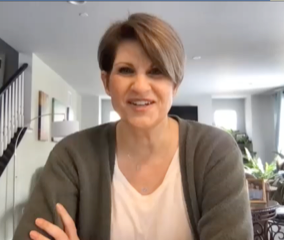After graduating from the University of Colorado College of Nursing at the Anschutz Medical Campus in December of 2021 with a Bachelor of Science in Nursing degree, Christopher Battelli faced the ultimate test – trying to pass the National Council Licensure Exam (NCLEX). Without it, he wouldn’t be able to work as a registered nurse. He took online preparatory courses, listened to podcasts and studied for hours.
“The worst thing is the stress and the fear and the pressure you build up for yourself. But I also knew that I had done enough studying. After I got done with the test, I was surprised at how good I felt. Now, I always tell people ‘It’s not that bad.’” Christopher Battelli, RN, BSN said.

Christopher Battelli, RN, BSN ('21) |
Battelli passed the state board exam on the first try. But nationally, the percentage of candidates taking the NCLEX-RN exam for the first time and passing fell from 88.2% in 2019 to 80.9% last year, according to the National Council of State Boards of Nursing. (Florida ranked the lowest in the nation for first-time pass rates, followed by Wyoming, New York, and Ohio.)
Now Battelli and CU Nursing graduate Barbara Klontz who is currently studying for the NCLEX, want to help other grads pass the test on the first try. From their experiences, we’ve created ‘Do This’ and ‘Don’t Do This’ checklists for people preparing to take the exam.
Mental Health
First and foremost, the graduates encourage you to focus on your mental health. A Journal of Nursing study shows 25% of students in nursing programs develop depression. In fact, nursing students showed higher levels of depression, anxiety, and stress than nursing faculty and medical students. Klontz says there’s a danger of the symptoms growing worse after graduation.
“A number of people in my cohort reported developing new symptoms of anxiety and depression. That’s partly because you’re studying, it’s frustrating because there’s no immediate reward after graduation; you’re isolated from people, you don’t have a normal schedule and you’re transitioning into a world that’s very scary,” says Barbara Klontz, BS, EMT, BSN.

Barbara Klontz, BS, EMT, BSN ('22) |
Klontz took off two weeks after graduation to dance, spend time with friends, and get outside in nature. She recommends every graduate vacation at least that long to mentally transition from one hurdle to the next. During that time, she recommends you get the required background check to take the NCLEX and register for the test so that when your vacation is over, you can hit the ground running. Please seek mental health help for unresolved anxiety, unexplained sadness, or any feelings that you find troubling.
Once you start studying, Battelli recommends you build in daily breaks and stop studying when you get tired.
“Set a schedule. Once you meet that goal, leave it alone because your brain is going to be exhausted, you won’t be able to store information anymore and you’ll be wasting your time. For me, I would study four hours, do some reviewing, and then the rest of the day I would not do anything. I would hang out with friends or go work out,” he said. “I think the biggest thing is managing your nerves. You can do that by taking care of yourself, eating well, exercising, and doing things that make you feel happy and healthy. You have to keep doing that even while you’re studying.”
Research the exam
The graduates say the next step is to research NCLEX requirements. It’s important to know the minimum score you need to pass the exam, the amount of time you’re allowed to complete the exam, and any other relevant information. This will help you create a plan and set realistic goals for yourself.
“This test isn’t about memorization. It’s about knowledge application. You can get a test question that you don’t know the answer to, and if you know the decision tree and safety, you have a good chance of getting it correct,” said Klontz. “It takes a completely different mindset and a completely different style of studying because, in addition to reviewing material, you have to understand the way they want you to think on the test. Understanding the decision tree they're applying to those answers is as important as knowing your facts.”
“What they're really testing you on is ‘Can you do the basics? Do you understand conceptually the nursing process? Do you understand the really important lab values?’ They will also ask you questions that test whether or not you know if that is a procedure a nurse should do, or if it is something that's beyond a nurse’s scope of practice. I think if you focus on the important, big, broad concepts in every kind of category, then you can apply them to most of the questions you're going to get. That's what I did. And that worked for me,” said Battelli.
Invest in a prep course
The graduates say when you start studying, use preparatory courses like Kaplan, U World, and Simple Nursing. Follow the book pattern and study the topics as they come up. Don’t review all of your school material before starting the courses. Klontz found that to be a waste of time.
“What’s great about these programs is that they will take you through it and it’s broken into different categories. There's adult medicine, pediatrics, there's pharmacology, etc. I focused on areas where I was weaker and tried to increase my knowledge in that area,” said Battelli.
Slowly ramp up the hours. Klontz started studying two to four hours a day. Over the next two weeks, she built up to studying six to eight hours a day, five days a week for four to six weeks.
“I’ll take an assessment and then I’ll take a break. Then I go back and look at the questions I got wrong, and I run through the material or I watch a lecture. I try to take a break every 30 minutes,” she said.
The graduates also recommend listening to podcasts from experts like Mark Klimek (free) and Dr. Zeeshan Hoodbhoy.
Social media sites like Facebook’s Nurses Helping Nursing Students can also be a great place to seek advice, get clarity on confusing topics and find support.
The night before
The day before the test, don’t study. Both test takers say it’s time to take a break and do nothing. Battelli says he spent the day before the NCLEX drawing, which relaxes him, and he went on a hard hike to exhaust his body.
“The night before I didn’t sleep that well. But I just tried to remember that I’m going to be fine. If I sleep six or seven hours, it’s not going to make me fail or pass the test. When I removed that pressure, I was more relaxed,” he said.
Klontz is planning on taking the day off too.
“We all know that cramming doesn’t work. Especially not for this type of test. Instead, you need to be calm, relaxed and focused. You can’t do that if you’re working yourself up over the things you don’t remember,” she said.
Test Day
Battelli recommends choosing the 8 am exam and getting it over with instead of waiting for a test in the afternoon and dreading it all day long.
During the test, Battelli recommends you ignore or even turn off a clock that tells you how many questions you’ve answered and how many you have left. People focus a lot on finishing 75 questions. 75 is the minimum number of questions the NCLEX tests you on. That’s a mistake because the second you hit the 76th question you panic and stop thinking clearly. For all you know, you might have finished on 76 but because you panicked you might have started making silly mistakes that prolonged the test. Just focus on doing your best and finishing the test, he advises.
Even if you don’t pass the exam on the first try, regulations allow you to wait 45 days and take it again. You can take the test up to eight times per year.
This would normally be the place where the graduate students wish you luck. But Klontz's professors have taught her luck has nothing to do with it.
“My professor said ‘You've studied, you worked hard, you have knowledge. This isn't about luck. This is about applying that knowledge.’ So, before our tests, she would say ‘Good knowledge everyone.’ I think it's good to remember that you invested in a program of study, a huge number of hours, time away from family and friends, and other things in life. You did all of those things to get here; you prepped yourself, learned the things that you're not strong in, and learned the decision tree and how to answer questions. So, take a deep breath and go take your test,” said Klontz.
Good knowledge everyone.
Do This! |
Don't Do This! |
|
|



